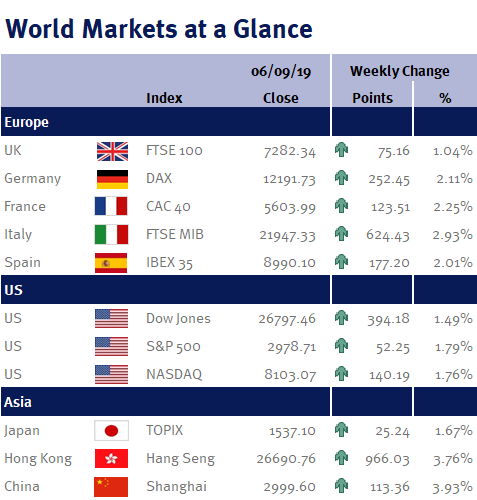As summer draws to a close, it was back to work for a lot of people this week, including UK politicians! The political turmoil which followed resulted in a volatile week for Sterling, whilst global equity markets posted modest returns.
Week ending 6th September 2019.
9th September 2019

Early in the week, Sterling fell below 1.20 versus the US dollar for the first time since January 2017. Sterling’s fall helped lift the FTSE 100, as the majority of companies in the FTSE 100 generate their revenue overseas and benefit from weaker Sterling. As the week progressed, Sterling recovered some lost ground as the Conservative Party lost their majority in the House of Commons and opposition parties progressed their efforts to block a hard Brexit. Whilst Sterling’s recovery weighed on international earners, domestically oriented companies gained, with the exception of utility companies. With a general election looking increasingly likely in the UK, the prospect of a Labour government weighed on utility company share prices, as Jeremy Corbyn has historically expressed a desire to nationalise them.
The UK PMI readings for August fell short of analyst estimates, increasing the chances of a technical recession in the region; with manufacturing PMI in particular coming in at 47.4, the lowest in 7 years and missing analyst estimates of 48.4. Services and Construction PMIs also fell marginally short of expectations, coming in at 50.6 and 50.2 respectively vs estimates of 50.5 and 51. Finally in the UK, following the quarterly review, it was confirmed that Marks and Spencer will be demoted from the FTSE 100 for the first time in the index’s 35 year history.
In the US, additional tariffs on Chinese imported goods came into force this week, but it will be some time before their impact feeds through to economic data. The Fed’s beige book was released this week and highlighted companies are concerned about tariffs and trade policy uncertainty, but generally they reported minimal impact so far. The US ISM manufacturing index fell to 49.1 from 51.3, whilst non-manufacturing beat expectations coming in at 56.4 versus forecasts of 54. The survey’s respondents remained concerned about tariffs and geopolitical uncertainty, however, they were mostly positive about business conditions. US non-farm payrolls also fell short of expectations; 130,000 new jobs were created in August, which was 30,000 fewer than forecast. Whilst average hourly earnings came in marginally ahead, growing 3.2% vs expectations of 3.0% year on year, but despite this, the overall disappointing US data helps bolster the case for the Fed to cut interest rates at the 17/18 September meeting.
Over in China, a report to Chinese congress by an internal commission concluded the 14 month trade dispute between China and the US has had little direct impact on the Chinese economy. They also stressed China’s cyclical economic downturn has been driven almost entirely by domestic factors. Whilst trade may not be weighing on the Chinese economy, trade talks were back on the cards, as it was reported this week officials from Beijing are expected to visit Washington in early October for talks. Elsewhere in China, Hong Kong withdrew the controversial extradition bill. This provided investors some relief as protests have been having a notable impact on the region. Finally, China’s central bank cut the required reserve ratio by 0.5% for all banks with an additional 1% cut for some city commercial banks. This will provide additional support for the economy, particularly helping reduce funding costs for the manufacturing sector.
Next week, UK politics will continue to dominate headlines as Parliament looks set to be suspended. On Thursday, the ECB will announce interest rates and provide an update on monetary policy. In terms of data, there are inflation figures from the US, China, Germany and France, retail sales data from the US, and unemployment data from the UK.
Peter Quayle, Fund Manager
Links to websites external to those of Wealth at Work Limited (also referred to here as 'we', 'us', 'our' 'ours') will usually contain some content that is not written by us and over which we have no authority and which we do not endorse. Any hyperlinks or references to third party websites are provided for your convenience only. Therefore please be aware that we do not accept responsibility for the content of any third party site(s) except content that is specifically attributed to us or our employees and where we are the authors of such content. Further, we accept no responsibility for any malicious codes (or their consequences) of external sites. Nor do we endorse any organisation or publication to which we link and make no representations about them.

